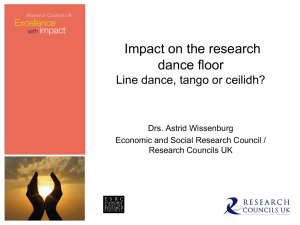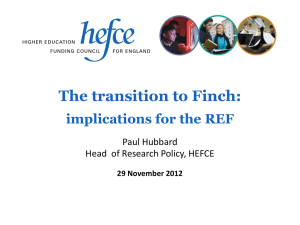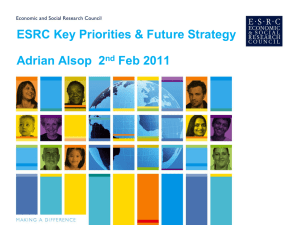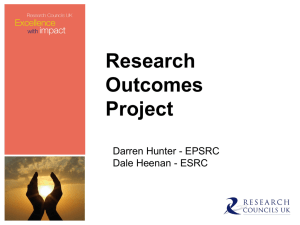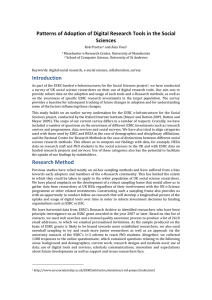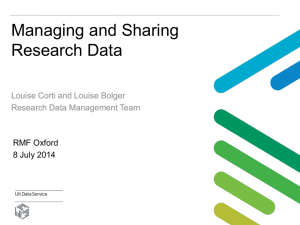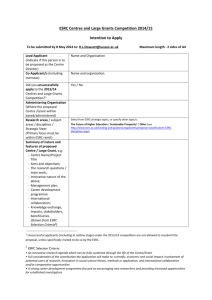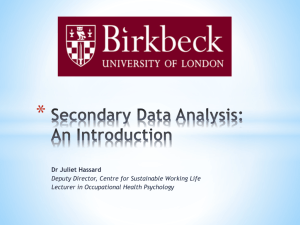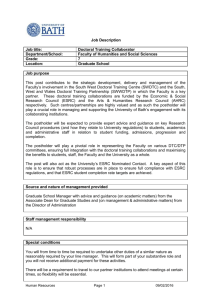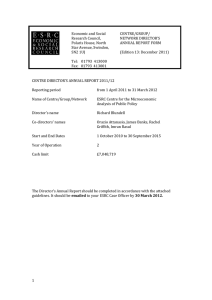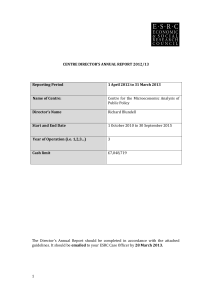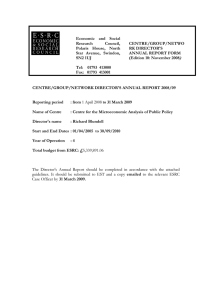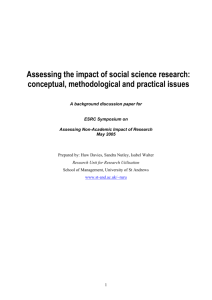What is impact? - South East Doctoral Training Centre
advertisement
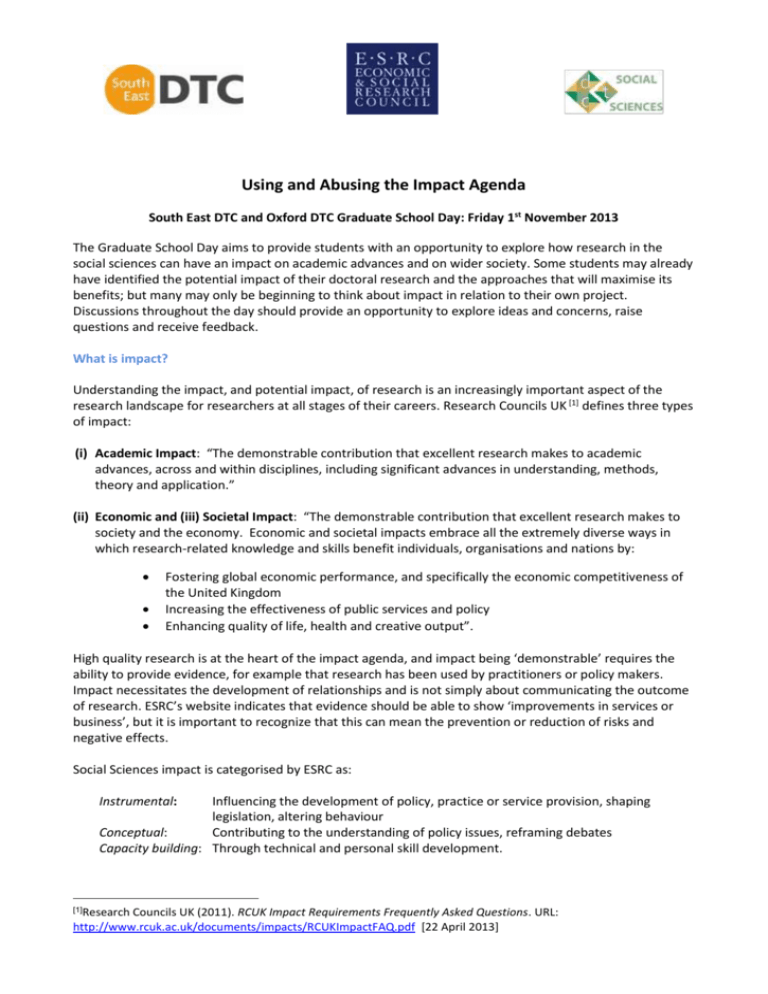
Using and Abusing the Impact Agenda South East DTC and Oxford DTC Graduate School Day: Friday 1st November 2013 The Graduate School Day aims to provide students with an opportunity to explore how research in the social sciences can have an impact on academic advances and on wider society. Some students may already have identified the potential impact of their doctoral research and the approaches that will maximise its benefits; but many may only be beginning to think about impact in relation to their own project. Discussions throughout the day should provide an opportunity to explore ideas and concerns, raise questions and receive feedback. What is impact? Understanding the impact, and potential impact, of research is an increasingly important aspect of the research landscape for researchers at all stages of their careers. Research Councils UK [1] defines three types of impact: (i) Academic Impact: “The demonstrable contribution that excellent research makes to academic advances, across and within disciplines, including significant advances in understanding, methods, theory and application.” (ii) Economic and (iii) Societal Impact: “The demonstrable contribution that excellent research makes to society and the economy. Economic and societal impacts embrace all the extremely diverse ways in which research-related knowledge and skills benefit individuals, organisations and nations by: Fostering global economic performance, and specifically the economic competitiveness of the United Kingdom Increasing the effectiveness of public services and policy Enhancing quality of life, health and creative output”. High quality research is at the heart of the impact agenda, and impact being ‘demonstrable’ requires the ability to provide evidence, for example that research has been used by practitioners or policy makers. Impact necessitates the development of relationships and is not simply about communicating the outcome of research. ESRC’s website indicates that evidence should be able to show ‘improvements in services or business’, but it is important to recognize that this can mean the prevention or reduction of risks and negative effects. Social Sciences impact is categorised by ESRC as: Instrumental: Influencing the development of policy, practice or service provision, shaping legislation, altering behaviour Conceptual: Contributing to the understanding of policy issues, reframing debates Capacity building: Through technical and personal skill development. [1]Research Councils UK (2011). RCUK Impact Requirements Frequently Asked Questions. URL: http://www.rcuk.ac.uk/documents/impacts/RCUKImpactFAQ.pdf [22 April 2013] What is the link between knowledge exchange and impact? Knowledge exchange is the process of a two-way dialogue, collaboration and sharing of ideas, skills and information between researchers and users of research that can ultimately generate impact. There are many different ways in which this process can occur including through discussions with non-academic partners, seminars, internships, and work placements. More information can be found at: http://www.esrc.ac.uk/funding-and-guidance/impact-toolkit/what-how-and-why/knowledge-exchange/ Planning for impact requires early consideration of how knowledge exchange can be effected and identifying the organisation/s or individual/s who will benefit from, as well as inform, the research, setting impact objectives, considering how benefits will be delivered and communicated, and what steps are needed to ensure that the benefit will be realised and is measurable against the objectives. Fuller guidance and tips can be found at: http://www.esrc.ac.uk/funding-and-guidance/impact-toolkit/developing-plan/index.aspx It is important to consider how, throughout all stages of a research project, knowledge exchange activities, and subsequently impact, can be accurately recorded. Why is impact important? (i) Societal and Economic Benefits Social sciences research can impact positively on the economy and wellbeing of society and contribute to professional practice and to effective and appropriate policy decision-making processes. The ESRC lists the following as ways in which this can occur: Increased economic prosperity, wealth creation and regeneration Improvements in social welfare and cohesion Cultural enrichment and enhanced quality of life Improvements in the effectiveness and sustainability of public, private and third sector organisations. (ii) Justification of Public Funding for Research The government invests heavily in social science research and expects universities and research councils to be accountable for expenditure of public funding. Being able to demonstrate impact is one way in which the worth and benefits of research can be shown. (iii) Engagement with Non-academic Partners Projects undertaken with non-academic collaborators engage these bodies in research and can bring in important additional sources of funding. (iv) Benefits to Researchers Considerations of knowledge exchange and impact are important for researchers as a means of refining and developing methodology, ensuring that research is pertinent, and allowing engagement with a wide range of research users. Impact activity can affect the profile of researchers and can help them to develop new skills (e.g. communicating in a variety of different ways including to lay audiences). What is REF and what has impact got to do with it? The Research Excellence Framework (REF) is the process by which the government evaluates the quality of research produced by UK universities. Outcomes are used to allocate research funding between institutions (so-called QR funding), provide accountability for the use of public funds, and establish benchmarks of standard across the higher education sector. In the current REF exercise, universities are being asked to submit impact case studies which show the nature of the impact and the particular non-academic sector or constituency affected. Albeit the impact must have arisen from excellent research, the emphasis of these case studies is not the underlying research. The ‘reach and significance of impacts on the economy, society and/or culture that were underpinned by excellent research’ will be assessed by panels and will carry a weight of 20% in the overall outcome awarded. For REF purposes, impact is defined by HEFCE as ‘an effect on, change or benefit to the economy, society, culture, public policy or services, health, the environment or quality of life, beyond academia and includes, but is not limited to, an effect on, change or benefit to: • the activity, attitude, awareness, behaviour, capacity, opportunity, performance, policy, practice, process or understanding • of an audience, beneficiary, community, constituency, organisation or individuals • in any geographic location whether locally, regionally, nationally or internationally.’ More information about ref can be found at: http://www.hefce.ac.uk/research/ref/ Challenges of Impact Research is inherently uncertain and predicting the outcome of a research project at the outset, and the potential impact that the research might have, is particularly challenging. The processes of bringing about impact are often complex and can involve contributions from very many different sources. As a result it can be difficult to identify precisely how particular pieces of work have brought about or influenced improvements and change. However, it is possible to consider at the outset of a research project how to engage with potential users of research and to evaluate progress during the project. Researchers submitting applications for research council funding are expected to have considered these issues and their proposed strategies for facilitating potential impact of their research in a ‘Pathways to Impact’ statement. Timing is a crucial factor in influencing the efficacy of academic, economic or societal impact. The interests of academics, governments, economies and society fluctuate according to a wide range of factors. These will influence the relevance and uptake of particular work at particular times. It can be important to consider aspects of timing so that impact is pertinent, allows for sufficient evidence to have been brought together to influence decisions, behaviour or beliefs, but is not so late that it is of little worth. The impact of some work can be a considerable length of time after the research has been completed and it is not always possible to predict the degree of relevance at the time of undertaking the research. There are many different factors that may contribute to changes in society, economy and policy, and research is only one among them. Disentangling the impacts of research from that of other factors and from their context may be very difficult and sometimes impossible, such as in some cases of “negative” or preventative impact, or of 'slow-burn' discursive impact arising from conceptual developments. In addition, actual impact rarely unfolds exactly as planned; serendipity plays a role. Thus impact plans need to be proactive, but realistic and flexible. Bigger Picture Questions Is ‘impact’ the right metaphor? Is it detrimental to research to make funding conditional on its perceived economic and social benefit? Should curiosity-driven research be defended? Is the scale of the impact important, i.e. is a change affecting a wider part of the population more important than a deeper change that drives more specialised policy or outcomes? Is impact best measured qualitatively, quantitatively, or both? Is investment in planning, monitoring and communicating impact likely to increase the actual benefits from research or will it simply drive a system that gets better at presenting it? How should academics balance their commitment to research with that to knowledge exchange and engagement with research users? Should impact be measured by the contribution of an individual, a research project, a research group or a research unit? If the link between research and impact is not linear, involves many other actors (policymakers, business, NGOs etc) and may occur long after the original research was undertaken, how can the contribution of the underlying research to the impact be evaluated? What words best describe the relationship between research and impact? Linear, causal, iterative, symbiotic, complex, conjectural, serendipitious? Do you have other suggestions? Is the 'quality' of impact dependent upon the quality of research? What about the reverse? How might one define quality in this context? Many of the most significant impacts from research are serendipitous, arising from curiosity-driven research. Will the requirements to plan and deliver targeted impact activities limit researchers’ and funders’ capacity to recognise important, but unexpected, benefits? What are the consequences of turning impact into a performance target?
